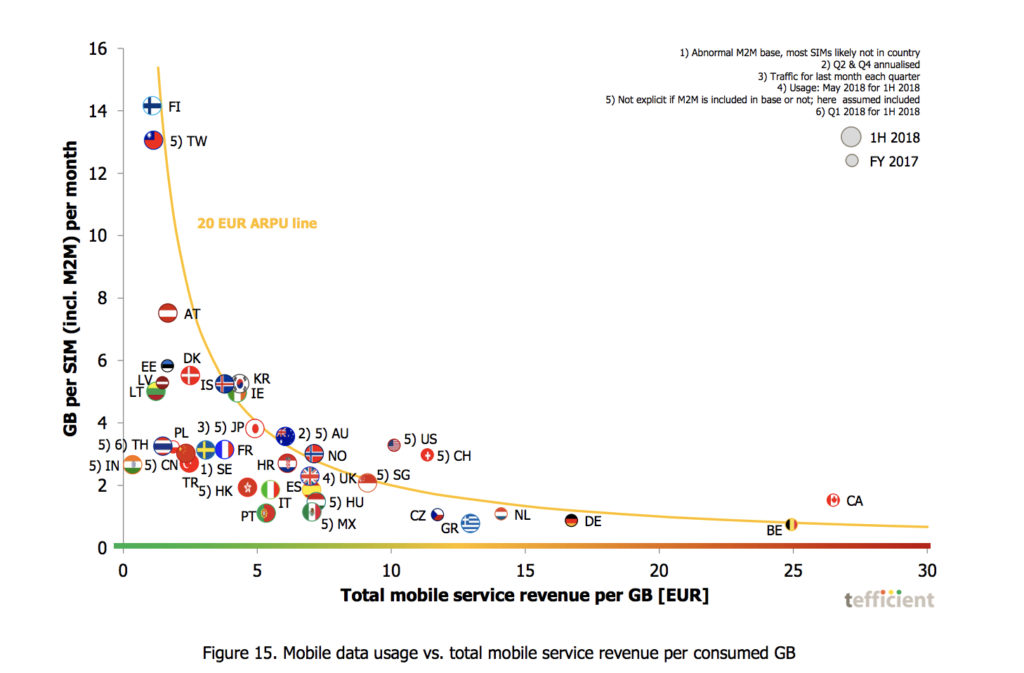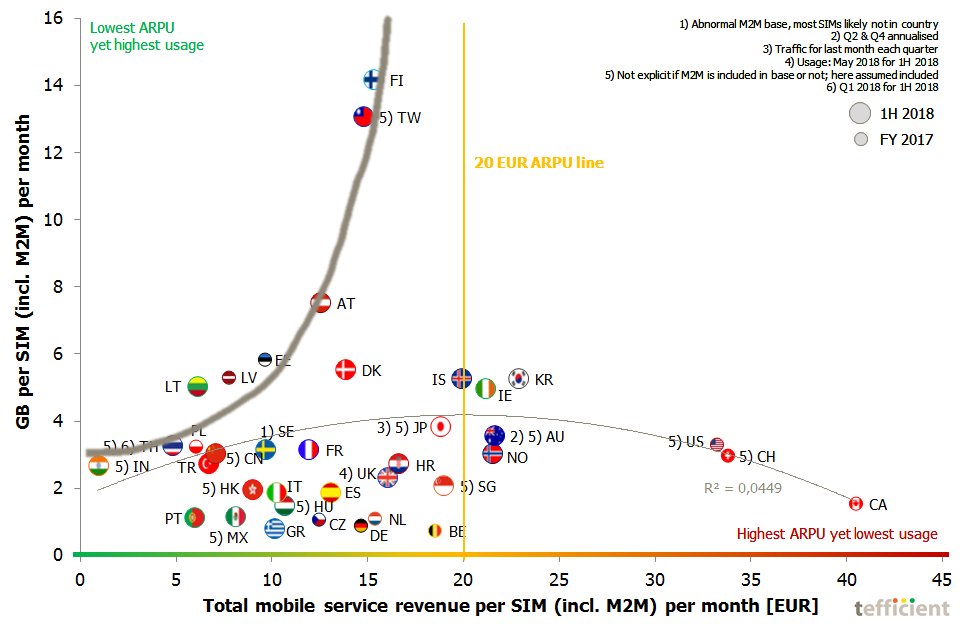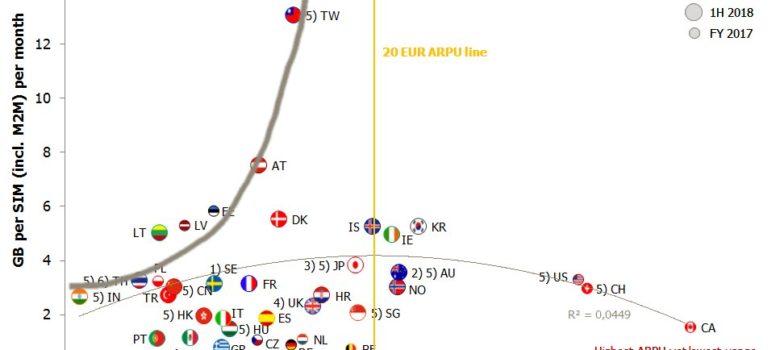Tefficient, a European-based consultancy on the wireless market, released its latest report this morning comparing pricing and usage in the global wireless market. The data, which incorporates the most recent CRTC numbers on the Canadian market, shows Canada as a global outlier when it comes to the revenues generated by wireless carriers. The report notes the unsurprising correlation between high prices and low data usage:
There is a prerequisite for continued data usage growth, though: The total revenue per gigabyte can’t be too high – like in Canada and Belgium. The total revenue per gigabyte here is roughly 70 times higher than in India and 23 times higher than in Finland. And consequently, mobile usage is lower than average.
The charts show where Canada stands relative to other countries with carriers generating more revenue per GB than anywhere else in the world and consequently Canada lagging behind many other countries in wireless usage.

Tefficient – Revenue per GB https://tefficient.com/wp-content/uploads/2019/01/tefficient-industry-analysis-3-2018-mobile-data-usage-and-revenue-1H-2018-per-country-final-17-Jan-2019.pdf
The link between data usage and total revenue per SIM is even more dramatic, with Canada standing alone.

https://tefficient.com/wp-content/uploads/2019/01/tefficient-industry-analysis-3-2018-mobile-data-usage-and-revenue-1H-2018-per-country-final-17-Jan-2019.pdf
Given the recent Canadian-government commissioned study that also found Canadian wireless pricing among the highest in the world, the issue is not whether Canadian consumers pay some of the highest rates for wireless services anywhere in the developed world (in fact, Telus suggests Canada should have the highest prices in the world). Rather, it is what, if anything, Innovation, Science and Economic Development Minister Navdeep Bains and the CRTC are prepared to do about it.








Canada must cut the foreign ownership restrictions on telecoms and allow competition from abroad to enter our market. There is absolutely no other way to fix this as the decades past have proven.These Canadian companies have not and will not ever change until forced by outside competition. It would appear they are in bed with the crtc all these decades, so they are no help to Canadians either. Government must act and change this now. At some point Elon Musk will have those satellites in place and this will all become moot, let’s hope it doesn’t take them till then to figure it out.
The communications oligopoly has extensive media holdings and have used that position to influence government and public opinion. No doubt journalists self censor for the sake of their career. Politicians know taking on the oligopoly means taking on a sizeable part of the media. As such proposing reform is political suicide. That is why doxing the worst telecommunications environment in the world is a third rali issue in Canada
AT & T left years ago because we are too small a market
The first step is to break up Bell and Rogers. They are a biopoly for all media in the nation. You can try to attract foreign providers, but our market really isn’t big enough for more than 2. But if you break Bell and Rogers up there is room for competition to eliminate the inefficient operators out of business. That would be a start
It was partially owned by Roger’s was it not so as to be in compliance with the ownership restrictions. I may be wrong but I’m pretty sure it was not AT&T full on competing hence the pullout I suspect. I remember DirecTV tried to compete too on the television side and they had to team up with Power Corp in montreal to meet the ownership requirement rules. Then the crtc told them they had to use canadian satellite and DirecTV said basically to get bent and left also. Again the wonderful crtc on our side as per usual.
It was originally cantel/AT&T then Rogers/AT&T and finally those accounts were all converted to be just Rogers.
Yeah, thought so, those ownership rules will kill it every time. That was my point. They don’t want it to work so it must be complete autonomy fri anti Canadian companies influence to really get it done.
Could somebody tell me the exact function of the CRTC? It’s mandate is a mystery.
No, not really but it appears to be supporting bell, rogers and telus in doing whatever they wish to do to Canadians for the most part. Occasionally they appear to just screw us over for the sake of it or in the name of so called Canadian content… that’s a prize one when they want to do something but have no real valid reason to do it to us they throw that in our faces.
We should Nationalize the network, remove all duplication in terms of cell phone towers and basic infrastructure.
There’s no reason why Freedom, Bell and Rogers should all have to build separate cell towers.
Then allow any company to sell access to this new Nationalized network.
You want redundant networks if for no other reason than protecting sustainable infrastructure. If you only have one system and it goes down then there are catastrophic problems.
Maybe it’s a matter that Canada’s market is small – we have a small population – and the costs of providing services are high – our small population is spread out over a huge land mass. So, on the pure economics of it all, you have a high cost structure spread out over relatively few people, thus high costs per user.
The solution could be to allow foreign companies to take over our market and basically have their large customer base subsidize our small one. One might ask why they would want to do that.
What would be interesting to see is a comparison of company cost per user and the profit margin per user.
that is the one study I have yet to see released and being public companies the shareholder meetings would have that data and revenue / SIMS would give that
I would be curious to see how the pricing correlates to population density and area covered. I am guessing in this scenario Belgium is likely to still going to be one the outliers. At the same time Canada might not be that out of line, in that scenario?
Pingback: News of the Week; January 23, 2019 – Communications Law at Allard Hall
Pingback: Canadians Pay The Highest Rates For Wireless Data, And The US Is About To Follow Suit – Curtis Ryals Reports
Pingback: Canadians Pay The Highest Rates For Wireless Data, And The US Is About To Follow Suit – MasMaz
Pingback: TextNow continues to grow despite pushback from incumbent wireless carriers – Free Cell Phone Service
Pingback: TextNow continues to grow despite pushback from incumbent wireless carriers – Unlimited Data Plans